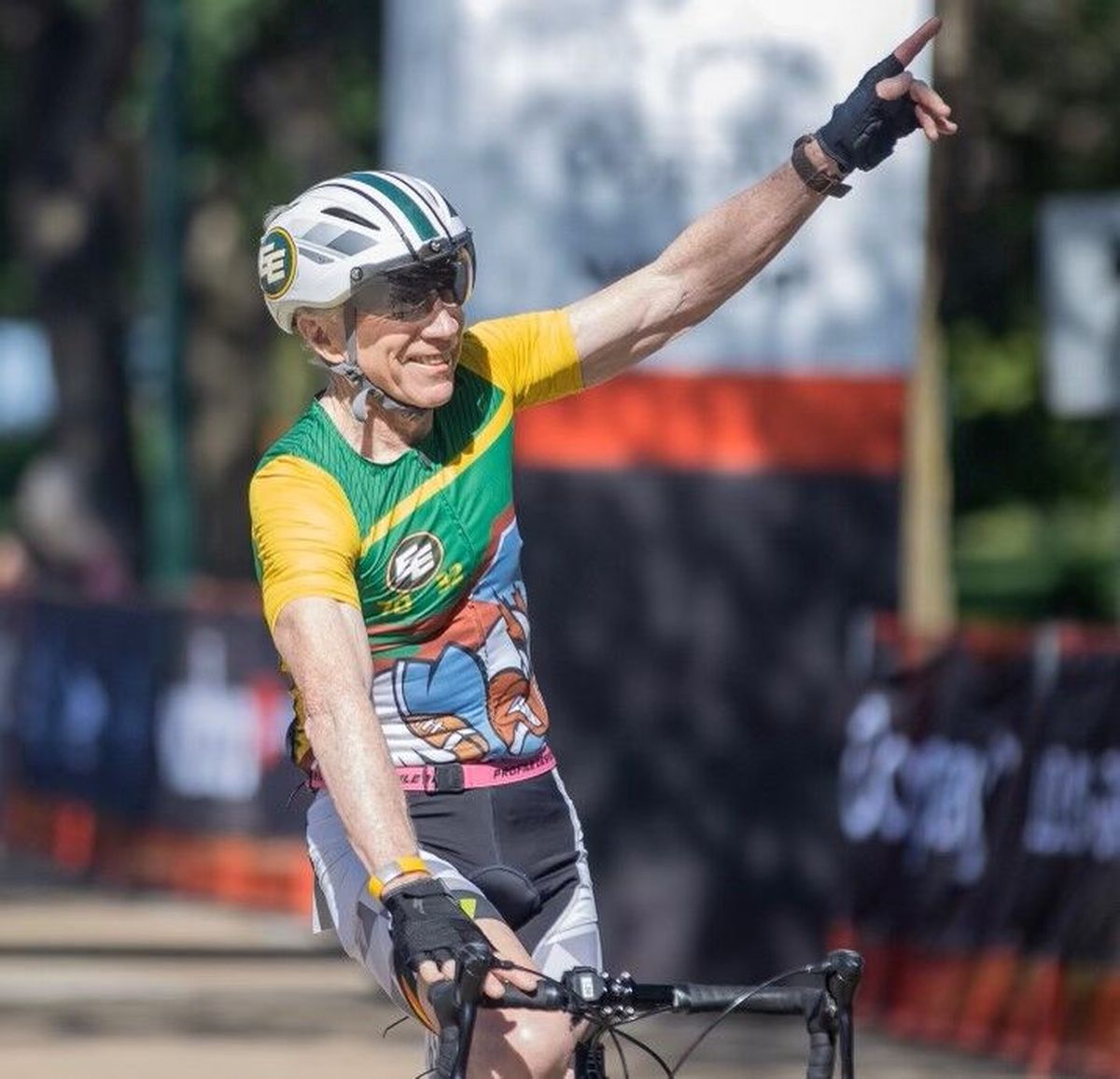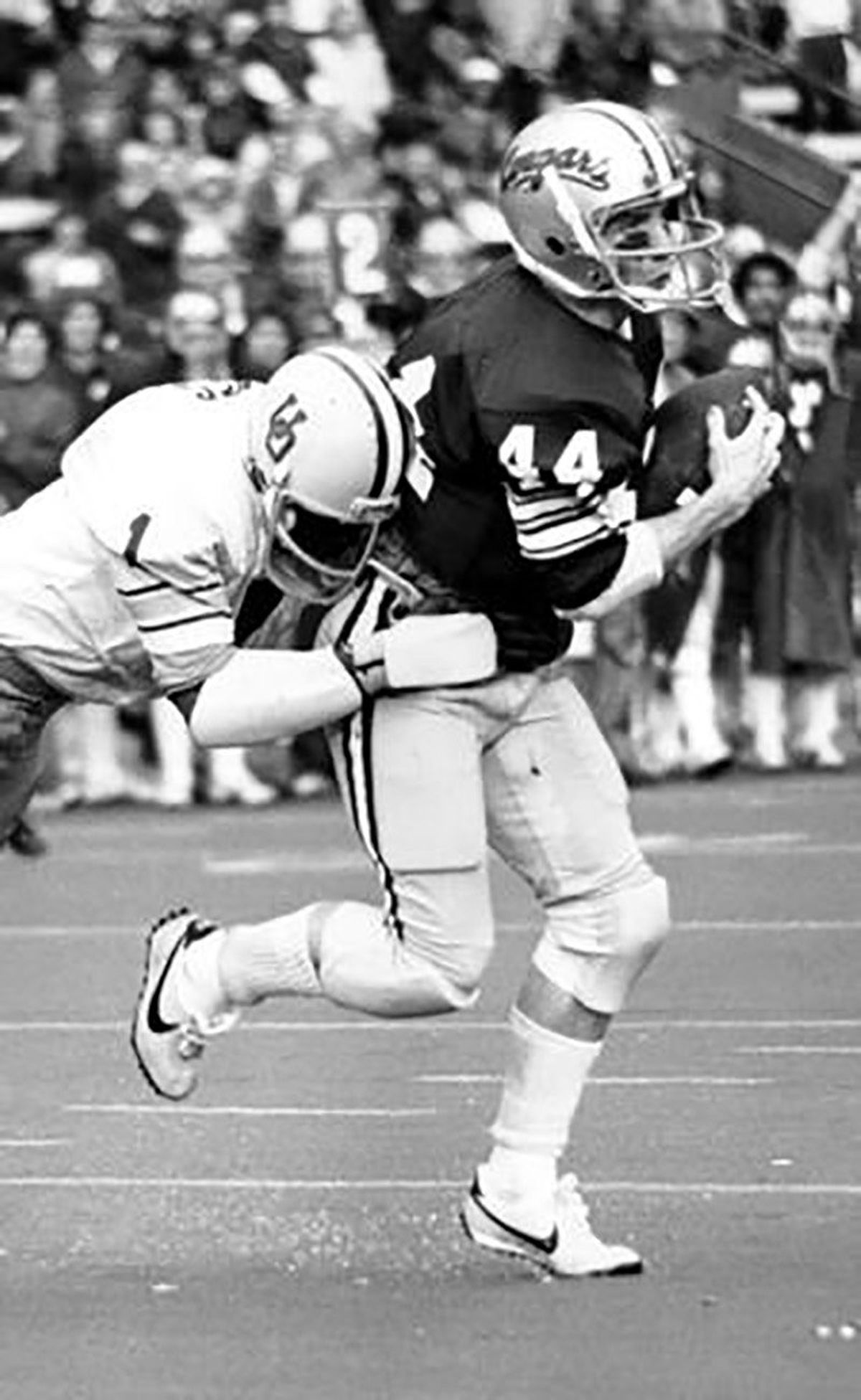Former Washington State, CFL hall of famer Brian Kelly set to race 23rd Ironman event in Coeur d’Alene
Former Washington State football player Brian Kelly, now 67, is ranked No. 27 in his Ironman age group. (Courtesy of Brian Kelly)
Brian Kelly, a Washington State University and Canadian Football League hall of famer, is set to race his 23rd Ironman on Sunday in Coeur d’Alene, a feat he largely attributes to his football career.
“I learned so much mentally from football,” Kelly said. “Particularly from my time in Edmonton (of the CFL). When the game is on the line and a play has to be made, lots of guys have their head down. But you’ve got to stay in it and learn how to handle pressure. I don’t get flustered because I’ve been there. So that part of football, the mental aspect, has been huge.”
Before he was ranked 27th in the world for the Ironman in his age group (second in Canada), Kelly was breaking records and winning Grey Cups with Edmonton. He played alongside stars like quarterback Warren Moon during his nine-year CFL tenure. By the time he retired, Kelly was CFL’s all-time leader in total receptions (575), yards (11,169), and touchdowns (97). Kelly was inducted into the CFL Hall of Fame in 1991 and was voted No. 20 on the CFL’s Top 50 players of all time in 2006.
“I wasn’t even going to play football (after college),” Kelly said. “I was small, and at the time the NFL was looking for big receivers. They kind of go through cycles in the type of guys they’re looking for.
“I was a small guy in a big-guy cycle. But (head coach) Hugh (Campbell) gave me that offer, so I got my car and drove up to Edmonton and ended up staying there for 30 years.”
Kelly said during his time in the CFL he never had a receivers coach, as Edmonton only carried a head coach. Most of his development was either self-taught or gained by experience.
“The Canadian game was made for me,” Kelly said. “It just suited my skill set really well, and by the time I retired I’d pretty much broken every receiving record that ever stood. I wasn’t really a different player than I had been in college, it’s just that the game there matched my abilities.”
Kelly was tied to Canada. Even when Edmonton’s Campbell and Moon moved from the CFL to the NFL in 1984, Kelly decided not to follow.
“I was really happy where I was,” Kelly said. “We’d won all these championships in a row. At the time I suppose I could’ve tried to make it in the NFL, but I was happy, my family was happy, and the CFL had treated me well.”
Despite a long playing career, Kelly, 67, said somehow the brutal nature of football hasn’t slowed him down.
“I played football for a lot of years, and believe me, you have no idea the carnage of football until you get older. It’s so much worse than people think it is,” Kelly said. “But I’ve had no surgeries, never been operated on. I don’t know how I’m able to keep doing this, but do I see an end? No, I don’t, not the way I feel now. I seem to be getting better, I don’t know why.”

An Ironman includes a 2.4-mile swim, 112-mile bike ride and a marathon. The average runner finishes upward of 12 hours and 30 minutes. Kelly’s best time is 11:45.
Kelly is set to run three Ironman events in the next 67 days.
Initially following his retirement, Kelly had begun running marathons – at one point running nine in one summer. But quickly, the former football player was ready for a new challenge.
“I got bored pretty fast,” Kelly said. “Plus, when you run that much, your legs are always hurting. Not that it stops you from running, but you’re always aching. So, when I switched over to Ironman training, I suddenly felt much healthier.”
The intensity on an Ironman day and the focus required is part of what keeps Kelly coming back.
“In life, there’s not a whole lot of days where you really have to be on completely,” Kelly said. “But on that day, you’ve got to be totally on, mentally and physically. You’ve got to be pacing and breathing and hydrating right.
“On that day, I have to be totally on point. I have to make decisions, be sharp in order to finish. That’s what I love about it. You can’t wander for 10 minutes.”
Kelly pointed to an Ironman in Wisconsin where a lack of focus sent him to the hospital.
He recalled being a little banged-up in months before the race and not spending as much time running as he would’ve liked. On the day of the race, Kelly made a decision to try and compensate with a faster bike time.
“I went really hard on the bike, figuring that running would be difficult for me,” he said. “But that was the dumbest damn thing I’d ever done. I got into the first mile of the run and realized this thing was over. Well, I got 19 miles in, passed out, and had to be taken out in an ambulance. It was my worst race, but that being said, I learned more in that race than I ever have, so I guess it needed to happen.”
Kelly went back to complete on that same Ironman course several times. Now, his focus is toward Coeur d’Alene and the course that awaits him on Sunday, where he is plenty motivated.
Kelly is ranked second in Canada for his age group, and the Coeur d’Alene Ironman marks the start of his quest for the top spot.
“I don’t know who this guy ahead of me is or what he does, but I’m determined to beat him. It’s driven me this year,” Kelly said. “I’ve worked out harder and pushed myself more this year than I have in a long time. I just want to be ahead of this guy.”
Kelly said training has been different this year due to the fires and smoke in Canada. Generally Kelly trains in the morning and the evening, mixing in several 5- or 6-hour bike rides or running to get some distance training. But the fires have prevented him from doing that.
Instead, Kelly has focused on short interval training with higher intensity, along with more indoor machine work. Whatever the weather, he hasn’t allowed it to be a setback. He will lean on his football days and the mental edge he feels he gained from them.
“Frankly, I feel sorry for my competitors who didn’t get that experience,” he said. “I don’t know how I’d handle the mental aspect of the Ironman without my football career.”
Kelly will compete Sunday in a crimson and gray race kit, a testament to his time in Pullman and Washington State. It was there that Kelly met his wife, Kim. The two have been married 42 years, and Kim is present at every race. Sunday will be no different.

“My wife always follows me,” he said. “She’s always been there to support me, and give me grief when I need it.”
“Couple years back I was finishing a half-Ironman in Calgary on a really hot day, I was on mile 12 of 13 and just absolutely boiling. Kim pops her head from the crowd, and in front of everyone she yells at me as I’m going by, ‘Can you please hurry up, I’m getting hot out here waiting for you!’ I guess you can do that when you’ve known someone since they were 19.”
Kim may not have to wait long in Coeur d’Alene on Sunday, if the WSU football hall of famer is on the cusp of a record.

